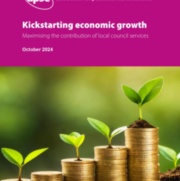Boost local council funding or risk derailing growth - New report
A new report by APSE, 'Kickstarting economic growth - Maximising the contribution of local council services', produced in collaboration with the University of Staffordshire and the Centre for Local Economic Strategies (CLES) – argues the Chancellor’s economic growth goals cannot be achieved solely via private investment, and that local councils must be part of the ‘growth agenda’.
Analysis by the University of Staffordshire identified councils as “investment enablers” uniquely positioned to stimulate investment through their powers over regeneration, housing development, infrastructure, transport, apprenticeships, local business networks and links to higher education.
However, Professor Mark Gregory—the lead report author and former UK Chief Economist for Ernst & Young—warned of a continuing “downward spiral” of local council services. Squeezed budgets and record demand are forcing councils to divert resources away from growth-supporting activities to prevent statutory services such as adult and children’s social care from collapsing. In 2022/23, only 11% of local council spending went on activities directly impacting economic growth.
Recent analysis by the Local Government Association predicted that without additional support, English councils will face a £6.2 billion funding gap from 2025 to 2027.
"Plans and strategies are only as strong as their weakest link. The Government's five missions are more reliant on local councils to deliver than any other actor and yet local councils have been the hardest hit by austerity. We need to fix the foundations and invest in local public services for growth”, Mark said.
The report calls for local councils to be an integral part of the growth agenda, with public sector investment viewed as an opportunity to not only boost growth, but also deliver long-term savings to public finances by pulling councils out of the chronic underinvestment they have faced – with resources reduced by 9% in real terms since 2010 according to the IFS.
Mo Baines, APSE Chief Executive, said: “Sound finances for local councils must be part of the UK's growth strategy. We must fix the foundations of local services - neglected spending areas at a neighbourhood level are key to providing attractive places to live, work and invest. We must recognise the value of affordable, high-quality homes, and the role of councils in the care and wellbeing of local communities to make a better economy where everyone can contribute to society.”
Despite these challenges, success in places such as Knowsley, where the local council has embarked on an ambitious growth plan enabling town centre regeneration project, housing developments, and an enriched cultural offering, demonstrates the potential for local councils to transform their local areas by stimulating investment.
Dr Sarah Longlands, Chief Executive of CLES, said: “A growth mission is about delivering the type of economic change communities desperately need – jobs, education, decent housing, and good public services. The best way to deliver that change is by investing in the local councils – organisations that know their communities best and can work creatively and collaboratively to build wealth that works hard for their place.”
Professor Steven Griggs, University of Staffordshire, said: “Local councils risk being sidelined from national debates over economic growth as policymakers turn to the promises of devolution and the work of combined authorities. This report brings out the importance, not only of investing for growth but equally of investing in our local councils. Its analysis is a challenge to government not to under-estimate the role that local councils can, and should, play in driving forward alternative economies and reducing place-based inequalities.”
Read the full report here
Notes to editor
- The Association for Public Service Excellence (APSE) is a not-for-profit local government body working with over 300 councils throughout the UK. Promoting excellence in public services, APSE is the foremost specialist in local authority frontline services and operates one of the UK’s largest research programmes in local government policy and frontline service delivery matters.
- This research was commissioned by APSE. The report authors were Professor Mark Gregory, University of Staffordshire; Professor Steven Griggs, University of Staffordshire; Sarah Longlands, CLES; and Mo Baines, APSE.
- For further press enquiries, or to arrange an interview, please use this link.


.png)



.png)